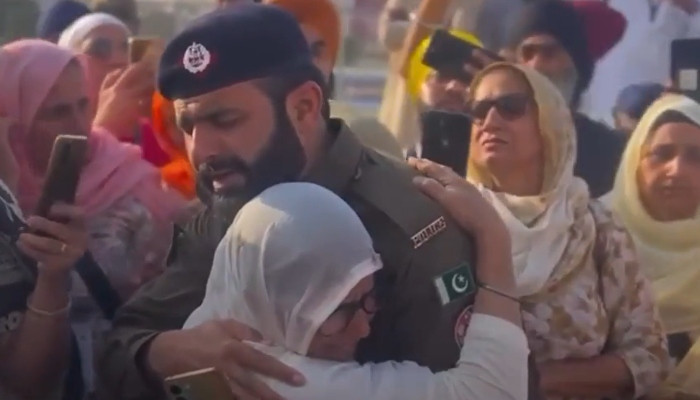Punjab Police Officer’s Gesture Wins Hearts
A heartwarming reception given by a Punjab Police officer to Sikh pilgrims at Gurdwara Panja Sahib, situated in Hasan Abdal, has become a viral sensation across social media platforms. The gesture is being lauded as a potent symbol of Pakistan’s dedication to interfaith harmony and welcoming spirit.
The widely circulated video showcases the police officer affectionately embracing an elderly Sikh woman, addressing her respectfully as “mother,” and reciting a moving poem with deep emotion.
The elderly woman, visibly touched by the officer’s words, is seen shedding tears of emotion as she embraces him. Fellow pilgrims and onlookers captured this touching interaction.
Social media has been flooded with messages expressing gratitude and admiration, celebrating the officer’s act of kindness and highlighting the overarching message of unity and mutual respect conveyed through this simple yet powerful gesture.
Gurdwara Panja Sahib holds immense significance as one of the most sacred sites for Sikhs and attracts a large number of pilgrims visiting Pakistan, particularly during religious festivals and commemorative events.
Annually, thousands of Sikh pilgrims journey to Pakistan to observe Baisakhi, a festival steeped in centuries of tradition that celebrates the wheat harvest and holds profound religious importance for the Sikh community.
Baisakhi also marks the anniversary of the Khalsa’s establishment by Guru Gobind Singh in 1699.
In preparation for this year’s Baisakhi celebrations, the Pakistani High Commission in New Delhi issued over 6,500 visas to Sikh pilgrims from India, facilitating their visits to revered religious sites in Pakistan between April 10 and 19. These sites include Gurdwara Panja Sahib, Gurdwara Nankana Sahib, and Gurdwara Kartarpur Sahib.
These visits are organized in accordance with the 1974 Pakistan-India Protocol on Visits to Religious Shrines, which seeks to promote religious harmony and enhance understanding between the two nations.
It is important to note that relations between Pakistan and India have deteriorated considerably in recent years, particularly following the deadly attack on April 22 in Indian Illegally Occupied Jammu and Kashmir (IIOJK). In this tragic event, 26 tourists, including one Nepali national, lost their lives in a shooting in the scenic Baisaran Valley of Pahalgam.
Following the assault, which was the deadliest on civilians in Kashmir in almost 25 years, India swiftly accused Pakistan of providing support for “cross-border terrorism.”
Islamabad has firmly denied any involvement in the attack, dismissing India’s accusations as baseless and irrational. The Pakistani government has also warned that it would respond decisively to any form of aggression.
In response to the incident, New Delhi reportedly suspended the Indus Waters Treaty, reduced diplomatic ties, revoked visas for Pakistani citizens, and closed the primary land border crossing with Pakistan.
Islamabad retaliated by expelling Indian diplomats and military advisors, cancelling visas for Indian nationals (excluding Sikh pilgrims), and shutting down its side of the main border crossing.
The United Nations (UN) has since appealed to both nations to exercise utmost restraint and work towards resolving their disputes amicably through dialogue.



Comments (0)
No comments yet. Be the first to comment!
Leave a Comment